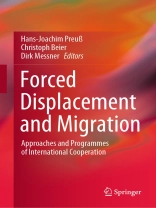This book presents effective long-term solutions for displacement and migration against the background of the current debates. It offers insights on practical suggestions for dealing with displacement and migration due to violence, examines ideas for the management of global migration movements and looks into the integration of refugees and migrants.
Throughout the chapters, experts from science, politics and practice shed light on the causes of global migration and the consequences of migration on a political, economic and social level. The focus of the discussion is not the avoidance of migratory movements, but above all the use of positive effects in countries of origin, transit and destination.
The book is a must-read for researchers, policy-makers and politicians, interested in international cooperation and in a better understanding of causes, consequences and solutions of displacement and forced migration.
Innehållsförteckning
Forced Displacement and Migration: Introduction and Overview.- Trends, Drivers and Dynamics of Flight and Migration.- Displacement Crises, Fragile States and Development Cooperation: Why Governance Support is Needed to Reduce Reasons to Flee.- Humanitarian – Development Integration? Comparing ‘Linking Relief, Rehabilitation and Development’, ‘Early Recovery’, ‘Resilience’ and the ‘Triple Nexus’.- Entrepreneurship and Innovation: How Institutional Voids Shape Economic Opportunities in Refugee Camps.- Beyond Emergencies: Towards a More Nuanced Understanding of the Various Impacts of Crises on Migrants.- Better Migration Management – A Project Implemented in the Horn of Africa.- Reconsidering the partnership approach in international migration cooperation.- Risk, Climate Change, and Human Mobility in International Policy.- Displacement and Migration as a Foreign Policy Challenge.- Legal Pathways for Low-Skilled Migrant Workers.- Community Sponsorship of Refugees.- Failed Asylum Seekers as Agents of Development? New Approaches to Voluntary Return and Sustainable Reintegration in Germany’s post-2015 Migration Policy.- Welfare Effects of Regular and Irregular Migration.- Neither Fortress nor Open Gate. Proposals for a Humane but Realistic Migration Policy.- Better Migration Management: Rethinking the Development and Mobility Paradigms.
Om författaren
Hans-Joachim Preuß is representative of the Friedrich-Ebert-Stiftung in Benin. Until June 2018 he was a board member of the Deutsche Gesellschaft für Internationale Zusammenarbeit (GIZ) Gmb H in Eschborn and Bonn, Germany.
Christoph Beier is head of the program “Good Governance for Local Development, South Caucasus” based in Tbilisi, Georgia. Until 2019 he was deputy chairman of the board of the Deutsche Gesellschaft für Internationale Zusammenarbeit (GIZ) Gmb H in Eschborn and Bonn, Germany.
Dirk Messner is president of the Federal Environment Agency in Dessau, Germany. Until 2019 he was Vice Rector of the United Nation University (UNU) and Director of the Institute for Environment and Human Security at the United Nations University in Bonn, Germany.












